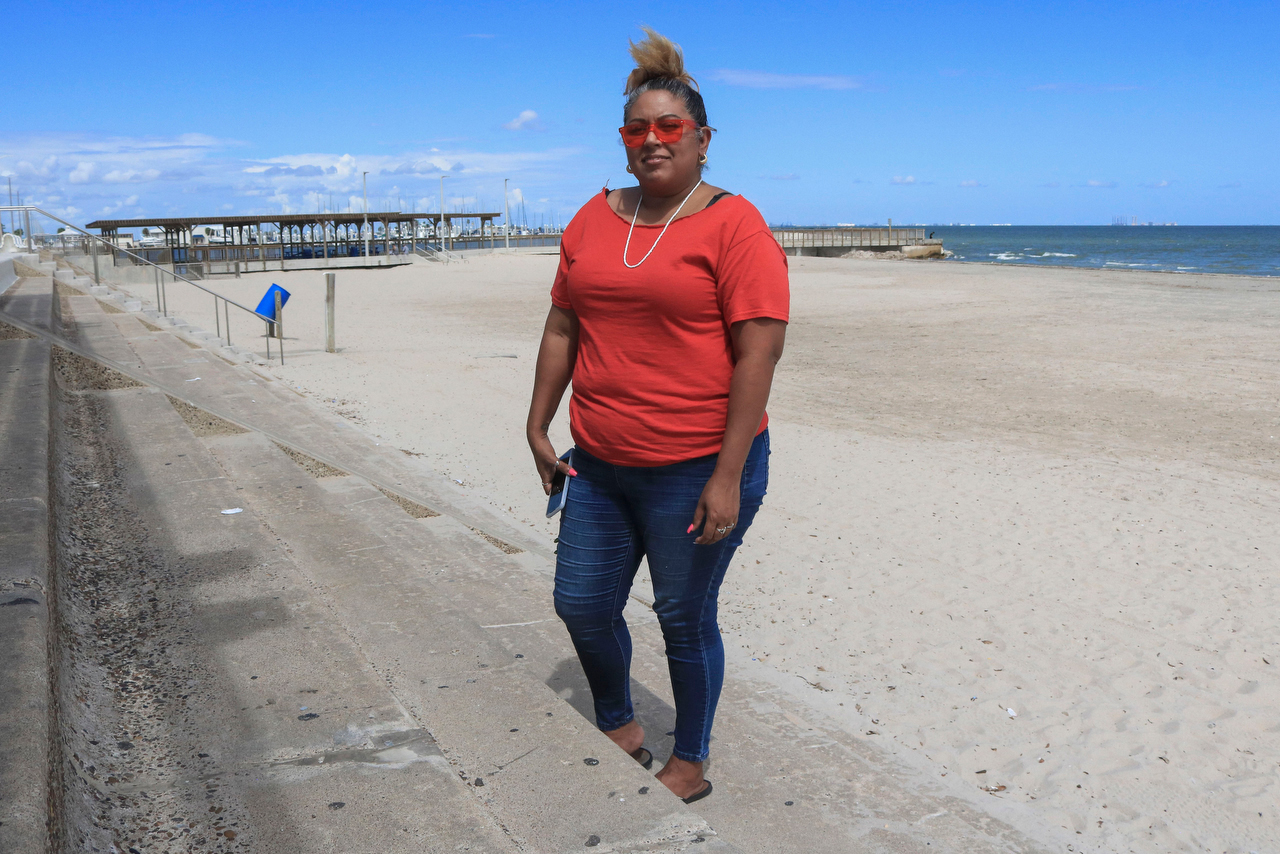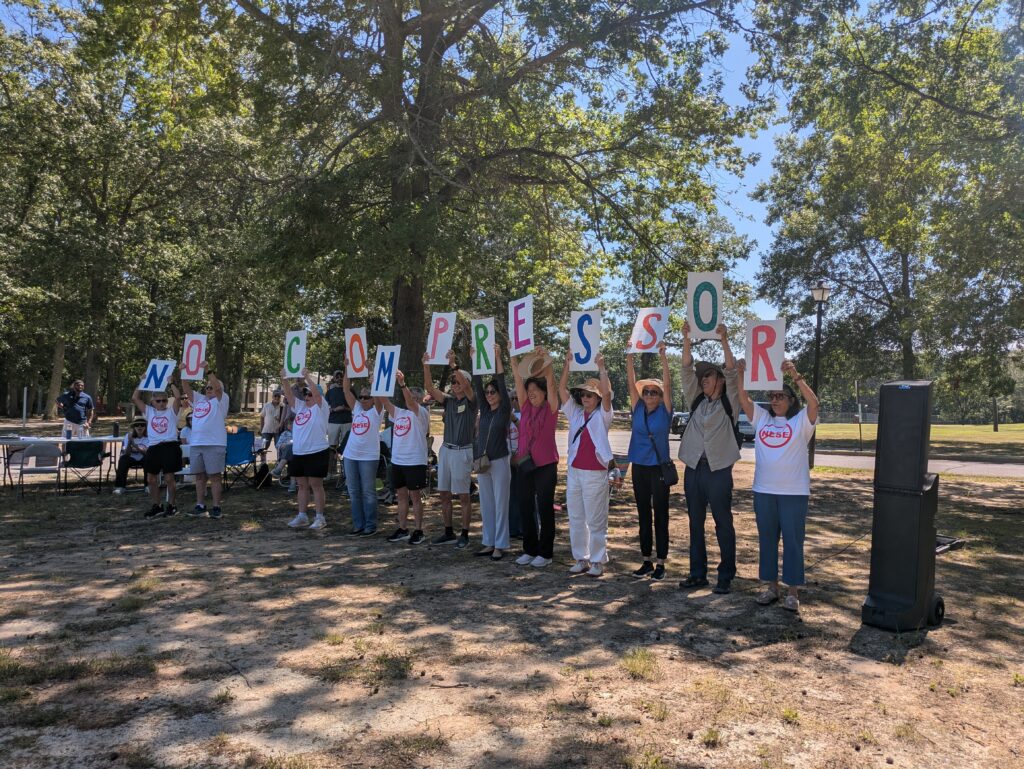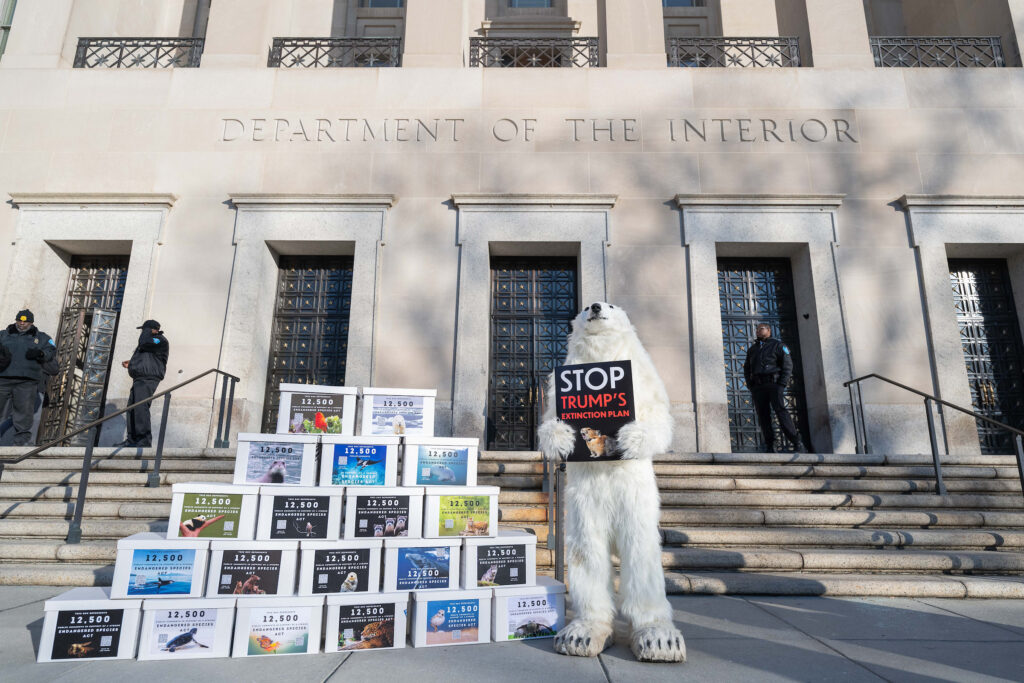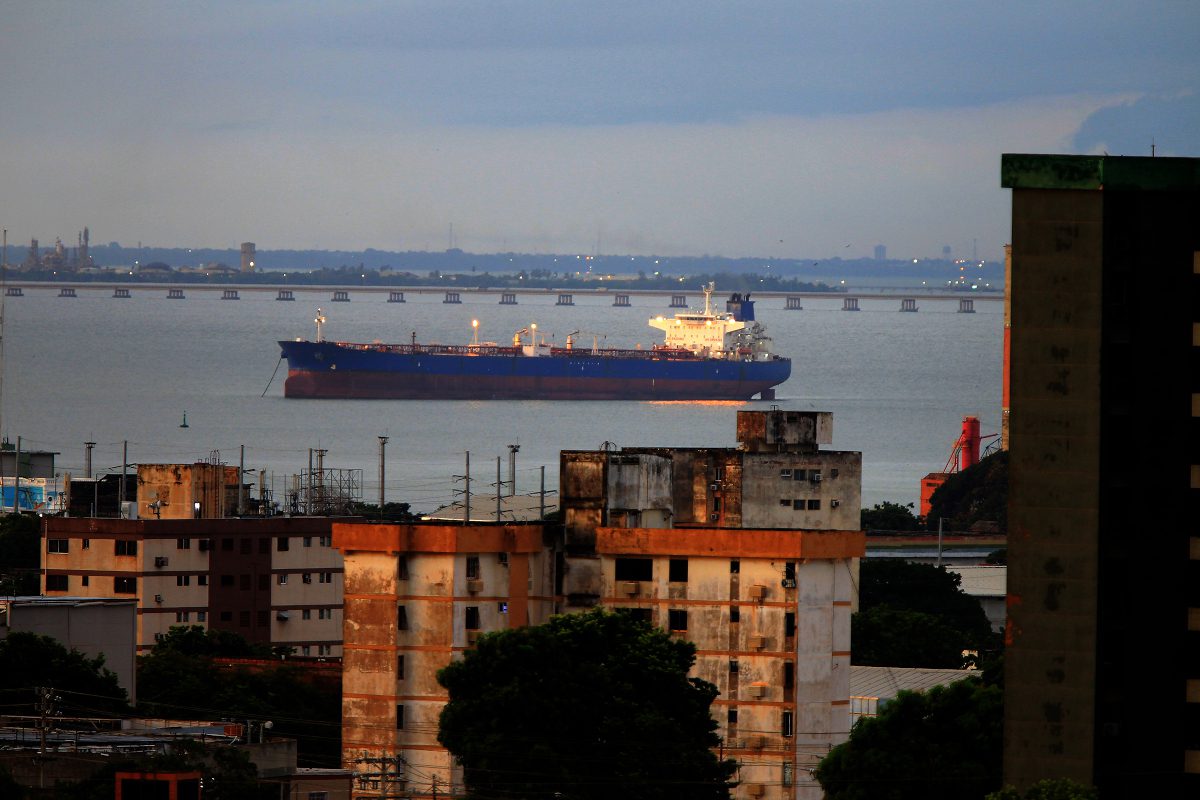Gaslighting: Second in a series about opposition to a wave of new natural gas pipelines, power plants and storage facilities on the drawing board in North Carolina.
Listen to an audio version of this story below.
MIDWAY, N.C.—Thousands of honey bees hover over a small meadow where the air seems to vibrate in time with their wings. Lisa Schehr and her sister Dawn Overmyer amble through their orbit, unbothered by the buzzing. The bees are similarly unfazed.
Schehr and Overmyer are beekeepers on a 12-acre family farm near Midway in northern Davidson County. Here their 60,000 bees live in wooden hives that are tucked into a field of goldenrod and fringed by woods. Near the road stands their family’s 130-year-old white, Colonial-style home, an historic barn and a gazebo whose centerpiece is a grindstone their grandfather hauled all the way from Kentucky.
Beneath the farm, a Transco pipeline is sending millions of cubic feet of natural gas along a 10,000-mile route from the Gulf of Mexico through the Southeast and on to New York. Twice Transco has carved into the family property to lay more pipe. Twice the barn and the woods have survived.
Explore the latest news about what’s at stake for the climate during this election season.
The family hopes they will survive again. But with every surveyor’s stake Transco plants on their property, the future is looking less certain.
Transco is asking federal regulators to install another pipeline alongside the existing ones, as part of its Southeast Supply Enhancement Project that includes portions of five states. It is one of the largest pipeline capacity expansions in the Southeast in decades, and necessary, Transco says, to meet regional demand for natural gas.
The project forms the spine of an immense natural gas build-out in North Carolina that would contribute to the global problem of climate change. That problem hit home last week, when historic flooding from Hurricane Helene devastated much of western North Carolina. Climate change contributed to the disaster, FEMA Director Deanne Criswell told The Guardian.
The Transco project would release millions of tons of methane, a super-pollutant 80 times more warming than carbon dioxide, into the atmosphere, even as worldwide methane emissions are increasing at an unprecedented rate.
Schehr and Overmyer are among hundreds of aggrieved homeowners, farmers and clean energy and environmental advocates who are banding together to defeat the build-out. They’re also concerned about public health, safety, water and air quality, as well as what they say is inadequate federal and state oversight of the natural gas industry.
“It has always been the case that gas has not received the same level of scrutiny as the electricity supply industry. The gas industry knows this,” said Shelley Robbins, senior decarbonization manager at the Southern Alliance for Clean Energy. “And since the pipelines are mostly underground, people don’t see them unless it affects them directly.”
If expanded, Transco’s pipeline would supply gas to Duke Energy’s four proposed new plants in Person and Catawba counties. It would intersect with two other proposed pipelines: Enbridge’s T15 Reliability Project, which runs 45 miles between Person County and Rockingham County, near Eden, and the MVP Southgate, also near Eden. It is a proposed extension of the main Mountain Valley Pipeline that runs for 300 miles through West Virginia and Virginia. It’s owned by a consortium of energy companies.
If the Federal Energy Regulatory Commission approves the Transco pipeline, the company could begin construction in the fall of 2026. But surveying is starting now, and Transco is prepared to take more private land—by legal force if necessary—along a 28-mile stretch in North Carolina.


Most of that segment is the Salem Loop that would traverse 24 miles through Guilford, Forsyth and Davidson counties.
The family’s barn, the woods and the hives lie squarely in the pipeline’s path.
They hope the pipeline could dogleg around the farm, or perhaps like a Transco project in New Jersey, it could be defeated or at least delayed. Whatever happens, they plan to hold out as long as they can.
Schehr is in her late 50s, a former model with high, delicate cheekbones, and strawberry blonde hair that flows down her back in gentle waves. Overmyer is in her 40s, a stained-glass artist who also works as a hair stylist in a nursing home. She is tall, with dark blonde shoulder-length hair that she often sweeps under a baseball cap. Her deep brown eyes sparkle with an impishness, like she is thinking of a joke. Both are fond of wearing billowing knee-length dresses sewn in ornate patterns.
The sisters have painted their hives with purple, pink and yellow flowers, and named each after its queen: Betty, Dolly, Feathered Indian, Eva, Daffodil and Sunshine.
“Their hives are so fragile, and so is their ecosystem,” Schehr said. She pinched a leaf from a bee balm plant and touched it to her nose, inhaling the fresh scent of mint. “Just one thing can take them out.”
Transco installed the initial segment of pipeline at the homestead in the late 1940s. A few years after Seldon Holiday, the sister’s grandfather, bought the property in 1976, Transco built a second line. Holiday didn’t want it, but had no recourse. The family did manage to save the barn, which Transco wanted to destroy.
How they rescued it is part of family lore. Several years ago, Schehr recorded a video of her grandfather telling the story at a family gathering:
“If you want to take the barn, go ahead,” said Holiday, who died in 2021 at age 92, “but you better bring the undertakers, too.”
“Their hives are so fragile, and so is their ecosystem. Just one thing can take them out.”
— Lisa Schehr, beekeeper
That was the end of it, the family thought. They kept their barn. Transco got the pipeline. Life could go on.
Then two months ago, Schehr and Overmyer’s parents, Barbara and Bill Schaffhauser, who are in their late 70s, received a certified letter from Transco. It didn’t mention plans for a new pipeline, just that the company needed permission to survey their property. Their parents thought Transco wanted to inspect the existing pipeline.
In the letter, the company included a check for $500.
They cashed it.
Now they’re wondering if that was a terrible mistake.
A Home, Solid and Immovable
When Holiday bought the farm on Old U.S. Highway 52 nearly half a century ago, an advertisement heralded it as a “dream estate.” Traffic would soon be diverted to the new U.S. Highway 52, making the property “more private.”
Now they have more neighbors, who live in brick ranch homes and modest split-levels with spacious yards that face the railroad. These neighbors, too, could lose parts of their land—a driveway, a corner of their yard—to the pipeline expansion.
Built in 1890, the family’s two-story home is painted white with black shutters. Four columns welcome visitors on the front porch, and a brick chimney runs the height of the house.
The home feels solid and immovable, in the way an old oak, if its roots are deep enough, can withstand a strong storm. Several generations live here: the Schaffhausers, Overmyer and her husband, Josh Brouhard, and their daughter, Mae Brouhard. Schehr has two children and lives nearby in Winston-Salem, with her partner of 25 years.


On a recent morning, several family members gathered around the dining room table, with Barbara Schaffhauser, the white-haired and bright-eyed matriarch, at the head. Overmyer passed around a carton of Bojangles biscuits, and everyone topped theirs with a dollop of honey from Queen Betty’s hive.
They commiserated about the pipeline expansion and volleyed comments across the table.
“Transco said they’ll just move the bees, and the barn is just ‘sentimental,’” Overmyer said.
“They wanted to cut down the magnolia tree,” Schaffhauser added.
“No one seems to be accountable,” said Jonathan Blaylock, a nephew. “They’re pushing fear tactics.”
“How would they feel if someone took their land?” Schehr chimed in.
“My son said, ‘Momma, wrap your head around this. It’s going to happen,” Schehr added later. “It’s hard to fight a billion-dollar company.”
In late August, Schehr attended a meeting of concerned residents hosted by 7 Directions of Service, an Indigenous-led environmental advocacy group. All of them were in the path of the Salem Loop. They traded concerns about property values, land rights and safety issues, especially how additional pipelines, running parallel to the others, will affect the size of the blast zone.


The natural gas industry refers to these zones as “high consequence areas.” When accounting for the radius of potential impact, these are locations where people would need to evacuate or find shelter in under 30 seconds. For elderly people, like the Schaffhausers, 30 seconds is not enough time.
Claire Spear, an environmental justice coordinator with the group, noted that earlier this year New Jersey state regulators denied Transco’s application for a water quality permit for a pipeline extension called the Northeastern Supply Enhancement Project. City officials along the route also passed resolutions opposing it. Transco withdrew their application and canceled the project.
“No matter what companies tell you, this is not a done deal,” Spear said.
“The pipeline folks will make you feel like you’re alone, that you have no choice,” said Aidan Loretz, a 7 Directions of Service intern. “But you’re not alone. You’re not disempowered.”
That lifted Schehr’s spirits. Her mother had told her daughters to fight for the farm, their legacy.
Schehr decided yes, she would fight, just like her grandfather did.
Transco’s Rationale
Mile Marker 1334. That’s where the family homestead lies along the Transco expansion route.
Schehr was a child when Transco installed a second segment of pipeline on family land. She remembers watching in awe as backhoes gnawed a massive chasm through the side yard. Now she will have to witness it again.
Transco claims the gas is needed to meet energy demand in the region—demand the company says cannot be met by renewables alone. Duke Energy Carolinas, whose service territory includes 50 counties in North and South Carolina, has committed to buying two-thirds of Transco’s gas, according to federal filings. Much of it would power the utility’s four new natural gas plants proposed for Catawba and Person counties.
Transco’s parent company, Williams, did not agree to an interview or written questions. Instead it provided a statement: “The project provides a low-emissions alternative to coal-fired electricity generation and includes efficient pipeline looping and modifications adjacent to the existing Transco corridor … ensuring critical access to clean and reliable natural gas for consumers in the region.”


Yet more than a half dozen environmental groups—the Southern Environmental Law Center, Appalachian Voices and the Sierra Club among them—are asking federal regulators to consider whether renewable energy and battery storage could help meet some of the demand. If that’s the case, the project would be unnecessary, the groups argue.
“Transco incorrectly assumes that the only alternatives that are viable are those that align precisely with an applicant’s narrow definition of a project’s purpose and need,” the groups wrote in their comments to the Federal Energy Regulatory Commission.
Transco has not officially released the pipeline’s total projected greenhouse gas emissions. But in its comments to FERC, the Rachel Carson Council estimated that over the life of the pipeline, it would emit 60 million tons of carbon dioxide equivalent annually, the equivalent of 16 coal plants.
This story is funded by readers like you.
Our nonprofit newsroom provides award-winning climate coverage free of charge and advertising. We rely on donations from readers like you to keep going. Please donate now to support our work.
Donate Now
Transco says on its website that “reducing its methane footprint is a priority, with 56 percent reduction in emissions by 2030 and net-zero by mid-century. The company says it will achieve this through “leak detection and repair, work practice improvements, and evaluating equipment upgrades on a site-specific basis.”
In evaluating a project’s environmental impacts, FERC is required by federal law to take a “hard look” at climate impacts. The agency must consider a project’s total direct and indirect greenhouse emissions, from wellhead to pipeline to compressor station to power plant, over its lifetime.
Transco, though, wants regulators to overlook those emissions that are released once the gas reaches its destination. The company argues that once it delivers the gas to the grid, it will ultimately arrive at “unknown destinations for unknown end uses”—a contention environmental groups called “absurd.”
Bee Highway
Overmyer maneuvered a golf cart behind the house, through the family’s woods and over a well-worn path grooved with tree roots. Schehr rode on the back. They entered a former tobacco field that now is full of goldenrod. The sisters call it bee highway. The bees travel it to forage for food, then return home with their baskets—small hairy sacs on their back legs—laden with pollen. In the fall, the bees fly on the highway to tap into maple, poplar and sourwood trees, where they gather wax to seal the hive.
The sun crested the treeline. Golden rays drenched the hives’ front porch, signaling to the bees that it’s time to begin their day.


“They all have a job,” Overmyer said, “the queens and workers and undertakers.”
Overmyer and Schehr went to school to learn how to raise bees, and in 2022 started with just two hives. Experts told them to expect to lose 40 percent of them the first year. But both survived, and, encouraged by the initial success, the sisters added four more. They’ve never lost a hive. This year, they harvested 200 pounds of honey.
Bees, so crucial to the world’s food systems, are vulnerable to the effects of climate change. Honey yields have declined since the 1990s, according to a recent Penn State study, due in part to widespread pesticide use, varroa mite infestations and habitat destruction.
Higher temperatures and more frequent droughts—indicators of climate change—are also curtailing the amount of nectar and pollen the bees rely on for food. And on very hot days, bees expend precious energy flapping their wings to cool the hive. It can be exhausting. Bees die when their wings wear out.
Early September is a dearth period, the bardo between dying and flowering plants, when nectar is scarce. Until the goldenrod blooms in October, the bees rely on the family to feed them a daily diet of sugar water. In the winter, the family supplies them with sugar bricks.




A bee sat on a small stone in a glass pie pan and drank. Schehr nudged it with her fingernail. “Nothing is more eye-opening than bees,” she said. “They’re so fragile.”
The sisters’ moods alternate between hope and despair. They have an ambitious vision for the farm: to expand Overmyer’s stained-glass business, start a farmstand, add more hives, plant paw paw trees and cultivate lavender, which will imbue the honey with floral overtones.
The pipeline could erase all of it: the habitat, the bees, their plans.
“The Continued Lack of Oversight”
The expansion presents specific safety issues because the new pipeline would be constructed next to existing ones that are carrying highly explosive gas. Transco acknowledged in its initial federal filings that construction of new pipelines between existing active pipelines “presents the need for additional safety precautions.” That includes installing protective covers on land over the existing lines, hammering the rock instead of blasting.
Transco has repeatedly violated federal safety regulations over the past 30 years, according to federal data. The Pipeline and Hazardous Materials Safety Administration opened 49 enforcement cases on Transco from 2006 to 2021, totalling $4.2 million in civil penalties. PHMSA has not cited the company in the past three years, federal records show.
Using federal records, the nonprofit organization Pipeline Safety Trust documented another 69 Transco violations from 1986 to 2007.
“When a pipeline is under construction, it’s the fox guarding the henhouse.”
— Shelley Robbins, Southern Alliance for Clean Energy
The violations include pipeline corrosion and failure to verify the integrity of pipeline welds, a vulnerable area of the steel. In some cases these failures have caused critical accidents: In Appomattox, Va., in 2008, a rupture and subsequent explosion of a pipeline destroyed two homes, damaged several others and injured five people who sustained first- and second-degree burns, according to PHMSA documents.
And in 2015, an explosion at a Louisiana compressor station killed four people and injured two, while forcing the evacuation of nearby residents. PHMSA fined the company $1.4 million.
“When a pipeline is under construction, it’s the fox guarding the henhouse,” Robbins of the Southern Alliance for Clean Energy said. “Unless the state or PHMSA comes in [to inspect], and they’re not there the whole time.”
As more pipelines are built, statistically the chances increase for an accident. “We’re increasing the likelihood because of the continued lack of oversight of the construction,” Robbins said. “There are little things that are caught, but so many are not caught.”
Dusk
One evening, the family relaxed in the field after a long day. Bats flitted overhead, backlit by a waxing moon shrouded in clouds. Soon, the barred owls would begin chatting, and the deer would stir in the woods. Billy Strings, a bluegrass musician, jangled from the speaker of a smartphone.
Overmyer’s husband, Josh, a tall, rugged man who works for a company that builds and maintains communications towers, poured sugar water into glass canning jars whose lids had been punctured with small holes, then tipped them upside down into a feeder for the bees. Their 11-year-old daughter, Mae, stayed in the truck, her face illuminated by the light of her phone.


A strange occurrence a few days earlier had left Overmyer shaken.
She had come home one recent afternoon to find two strangers on the farm behind a bush. It turned out the men were contractors for the pipeline. She told them to leave. But there were no cars in the driveway. Instead, the men had parked down the road.
For Schehr and Overmyer, this was yet another unsettling incident in their interactions with Transco. Schehr believes Transco took advantage of her parents—elderly, kind people for whom the $500 check the company sent them is a small windfall.
As darkness fell, the bees began bearding. While the queen and young bees stay inside the hive, the foraging bees often cluster outside where it’s cool. Guard bees patrol the entrance. The rest cling to one another, hanging on.
About This Story
Perhaps you noticed: This story, like all the news we publish, is free to read. That’s because Inside Climate News is a 501c3 nonprofit organization. We do not charge a subscription fee, lock our news behind a paywall, or clutter our website with ads. We make our news on climate and the environment freely available to you and anyone who wants it.
That’s not all. We also share our news for free with scores of other media organizations around the country. Many of them can’t afford to do environmental journalism of their own. We’ve built bureaus from coast to coast to report local stories, collaborate with local newsrooms and co-publish articles so that this vital work is shared as widely as possible.
Two of us launched ICN in 2007. Six years later we earned a Pulitzer Prize for National Reporting, and now we run the oldest and largest dedicated climate newsroom in the nation. We tell the story in all its complexity. We hold polluters accountable. We expose environmental injustice. We debunk misinformation. We scrutinize solutions and inspire action.
Donations from readers like you fund every aspect of what we do. If you don’t already, will you support our ongoing work, our reporting on the biggest crisis facing our planet, and help us reach even more readers in more places?
Please take a moment to make a tax-deductible donation. Every one of them makes a difference.
Thank you,


















